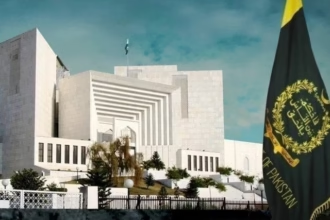Washington — The Supreme Court on Friday said it will allow the Trump administration to partially enforce an executive order that seeks to end birthright citizenship while proceedings in a challenge to the directive move forward, ruling that universal injunctions issued by lower courts likely exceed the authority Congress has granted them.
In a widely anticipated decision involving the scope of nationwide injunctions, the high court said that the universal orders likely go beyond the equitable authority that Congress has given to the federal courts. Justice Amy Coney Barrett authored the majority opinion for the 6-3 court, with the liberal justices in dissent.
“Some say that the universal injunction ‘give[s] the Judiciary a powerful tool to check the Executive Branch.’ But federal courts do not exercise general oversight of the Executive Branch; they resolve cases and controversies consistent with the authority Congress has given them,” Barrett wrote. “When a court concludes that the Executive Branch has acted unlawfully, the answer is not for the court to exceed its power, too.”
Sotomayor read her dissent aloud from the bench.
The birthright citizenship case
The court’s ruling came in a trio of emergency appeals by the Trump administration arising out of the president’s executive order seeking to end birthright citizenship. The Justice Department had asked the Supreme Court to narrow the scope of three separate injunctions that blocked implementation of Mr. Trump’s policy nationwide while legal challenges brought by 22 states, immigrants’ rights groups and seven individuals moved forward.
But instead of swiftly deciding whether to grant the Trump administration emergency relief, the Supreme Court held arguments on whether to restrict the use of nationwide, or universal, injunctions, which are judicial orders that prevent the government from enforcing a policy anywhere in the country and against anyone.
The court did not consider or rule on the merits of Mr. Trump’s birthright citizenship plan, and its decision means that the executive order cannot be enforced against the states, organizations and individuals who challenged its legality. The Trump administration has said agencies have 30 days to issue public guidance about implementation of the policy.
The dispute over the president’s attempt to unwind birthright citizenship has become intertwined with the administration’s battle against nationwide injunctions. These sweeping orders have frustrated both Democratic and Republican presidents seeking to implement their agendas among gridlock in Congress, and the fight over them has been simmering for several years.
The Congressional Research Service identified 86 nationwide injunctions that were issued during Mr. Trump’s first term and 28 granted while former President Joe Biden was in office. As to the president’s second term, the Congressional Research Service found 17 nationwide injunctions were issued during the first 100 days, though the Trump administration estimated last month there have been far more — at least 40 of these orders, and most coming from the same five judicial districts.
Some of the justices have suggested in past writings that the Supreme Court would have to clarify whether nationwide injunctions are allowed at all, and members on both ideological sides of the bench have been critical of them.
But the orders that blocked Mr. Trump’s birthright citizenship executive order landed the issue before the Supreme Court earlier this year, though the administration has railed against them in requests to enforce its transgender military ban, fire thousands of federal probationary workers and move forward with mass layoffs of government employees.
The president’s executive order on birthright citizenship was one of the first that he signed on his first day back in office and is among several directives that seek to target migrants who are in the U.S. The Trump administration’s immigration policies have led to high-profile clashes with the courts — namely Mr. Trump’s use of the wartime Alien Enemies Act to deport alleged members of a Venezuelan gang.
While the 14th Amendment has for more than a century been understood to guarantee citizenship to all people born in the U.S., Mr. Trump’s order denied birthright citizenship to children born to a mother who is unlawfully present in the U.S. or who is lawfully present on a temporary basis; or whose father is neither a citizen nor lawful permanent resident.
The president’s order directed federal agencies to stop issuing documents recognizing U.S. citizenship to children born after Feb. 19.
More than half-a-dozen lawsuits challenging the measure were filed in courts throughout the country before it took effect, and three federal district courts in Washington, Maryland and Massachusetts each blocked the government from implementing the birthright citizenship order.
Federal appeals courts in San Francisco, Boston, and Richmond, Virginia, then refused requests by the Trump administration to partly block the lower court orders.
The Justice Department filed emergency appeals of the three decisions with the Supreme Court in mid-March and asked it to limit enforcement of the birthright citizenship order to 28 states and individuals who are not involved in the ongoing cases. The administration said that at a minimum, the Supreme Court should allow agencies to develop and issue public guidance regarding implementation of Mr. Trump’s executive order while proceedings continue.
Like other requests made to the Supreme Court, the Justice Department took aim at the breadth of the injunctions issued by the district courts, which are nationwide in scope and cover states and individuals who are not involved in the litigation before them.
The president and his allies have attacked judges for issuing nationwide injunctions in the slew of legal challenges to Mr. Trump’s policies, and even called for some to be impeached.
The Justice Department said in a filing that universal injunctions have reached “epidemic” proportions since Mr. Trump returned to the White House in January.
“Those injunctions thwart the executive branch’s crucial policies on matters ranging from border security, to international relations, to national security, to military readiness,” Solicitor General D. John Sauer wrote. “They repeatedly disrupt the operations of the Executive Branch up to the Cabinet level.”
But the plaintiffs in the cases challenging the directive urged the Supreme Court to leave the district court orders in place.
In a filing with the Supreme Court, officials from 18 states, the District of Columbia and San Francisco called the Trump administration’s request “remarkable,” as it would allow the government to strip hundreds of thousands of American-born children of their citizenship while the legal challenges move forward and render them “deportable on birth and at risk of statelessness.
The states argued that the Trump administration seeks to violate binding Supreme Court precedent that recognized birthright citizenship is guaranteed by the 14th Amendment.









